Event Archive: 2013-2014
Did you miss a Clough Center event? Explore our archive below for past event information and visit our YouTube page for videos of recent conferences and lectures.
SPRING 2014 LECTURES & CONFERENCES
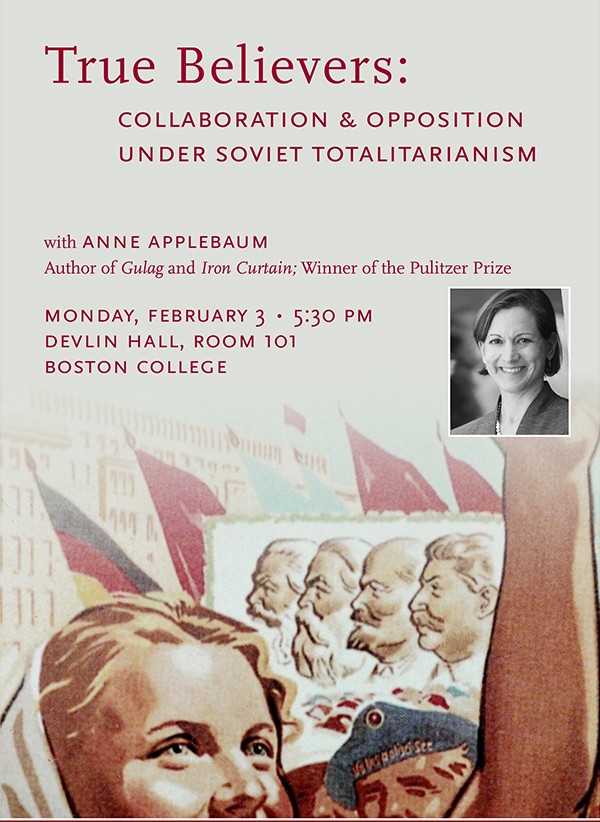
True Believers: Collaboration and Opposition under Soviet Totalitarianism with Anne Applebaum
Monday, February 3, 2014
5:30 p.m.
Devlin Hall, Room 101
Anne Applebaum is a columnist for the Washington Post and Slate, and a historian of Central and Eastern Europe. She is the author of several books including Gulag: A History, which won the 2004 Pulitzer Prize for non-fiction, as well as Iron Curtain: The Crushing of Eastern Europe, 1945-1956 which was nominated for the National Book Award in 2012and won the Cundill Prize for Historical Literature. Her reviews appear regularly in the New York Review of Books and the New Republic, and she also writes occasional columns in the Daily Telegraph. She directs the program on Global Transitions at the Legatum Institute in London, and in 2012-2013 she was the Phillipe Roman visiting Professor of History and International Relations at the London School of Economics. Between 2001 and 2006 she was a member of the editorial board of the Washington Post. She is a former deputy editor of the Spectator magazine, a former political columnist for the Evening Standard newspaper, and a former Warsaw correspondent for the Economist.
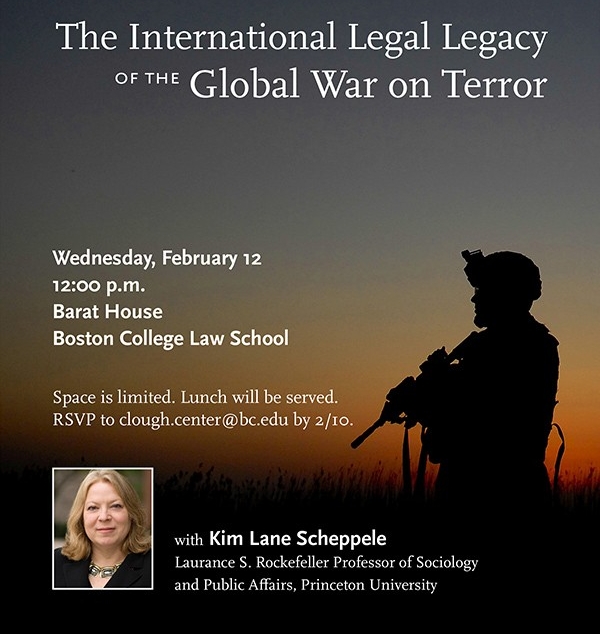
The International Legal Legacy of the Global War on Terror with Kim Lane Scheppele
Wednesday, February 12, 2014
12:00 p.m.
Barat House, Boston College Law School
Kim Lane Scheppele is the Laurance S. Rockefeller Professor of Sociology and International Affairs in the Woodrow Wilson School and the University Center for Human Values as well as Director of the Program in Law and Public Affairs at Princeton University. She joined the Princeton faculty in 2005 after nearly a decade on the faculty of the University of Pennsylvania School of Law, where she was the John J. O'Brien Professor of Comparative Law. Scheppele’s work focuses on the intersection of constitutional and international law, particularly in constitutional systems under stress. After 1989, Scheppele studied the emergence of constitutional law in Hungary and Russia, living in both places for extended periods. After 9/11, Scheppele researched the effects of the international "war on terror" on constitutional protections around the world. Her many publications on both post-1989 constitutional transitions and on post-9/11 constitutional challenges have appeared in law reviews, social science journals and multiple languages. In the last two years, she has been a public commentator on the transformation of Hungary from a constitutional-democratic state to one that risks breaching constitutional principles of the European Union.
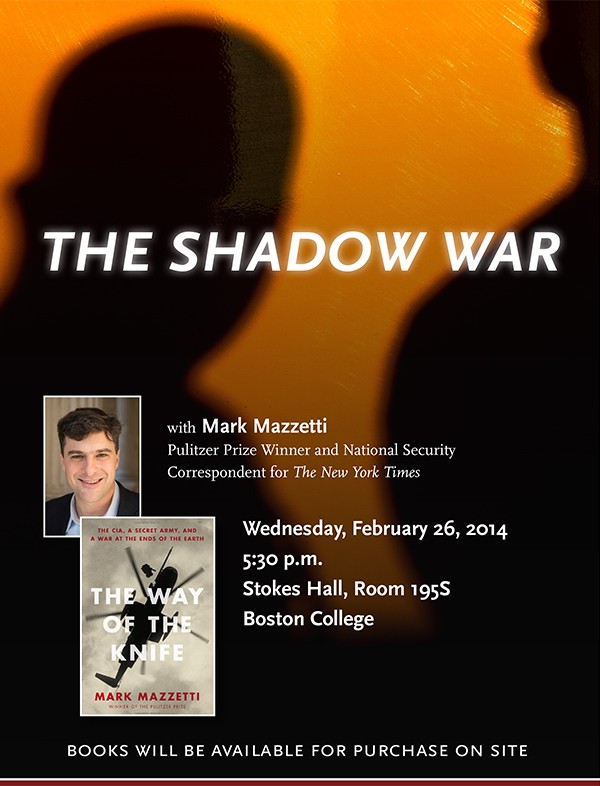
The Shadow War with Mark Mazzetti
Wednesday, February 26, 2014
5:30 p.m.
Stokes Hall, Room 195S
Mark Mazzetti a national security correspondent for The New York Times. In 2009, he shared a Pulitzer Prize for reporting on the intensifying violence in Pakistan and Afghanistan and Washington’s response, and he has won numerous other major journalism awards, including the George Polk Award (with colleague Dexter Filkins) and the Livingston Award, for breaking the story of the CIA's destruction of interrogation videotapes. Mazzetti has also written for the Los Angeles Times, U.S. News & World Report, and The Economist. He lives in Washington, D.C. with his family.
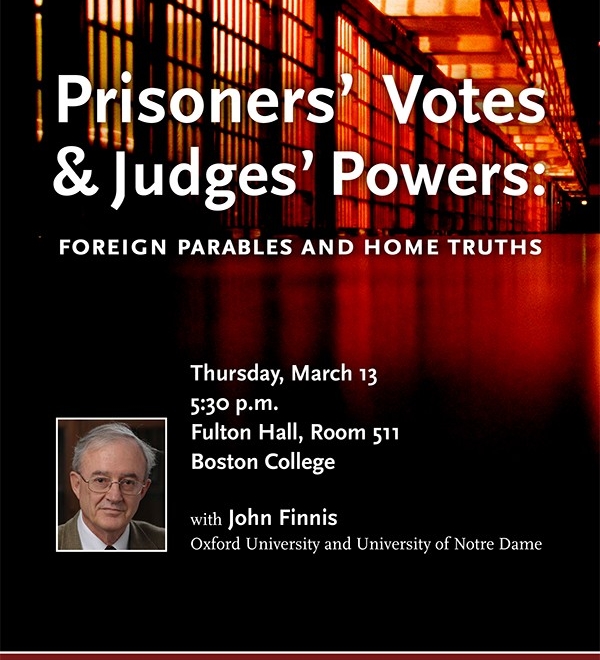
Prisoners' Votes and Judges' Powers: Foreign Parables and Home Truths with John Finnis
Thursday, March 13, 2014
5:30 p.m.
Fulton Hall, Room 511
John Finnis is a professor of law at both Oxford University and the University of Notre Dame. His work centers on legal scholarship and the philosophy of law, and he teaches courses on jurisprudence, political theory, and constitutional law. He is a fellow of the British Academy and a member of Gray’s Inn.
Professor Finnis earned an L.L.B. from Adelaide University in 1961 and a doctorate from Oxford University as a Rhodes Scholar in 1965. He has previously taught law at the University of California at Berkeley, the University of Malawi, and Boston College Law School. He has published widely in legal theory, moral and political philosophy, moral theology, and history. He is the author of Natural Law and Natural Rights (1980), Fundamentals of Ethics(1983), Aquinas: Moral, Political and Legal Theory (1998) and The Collected Essays of John Finnis (2011).
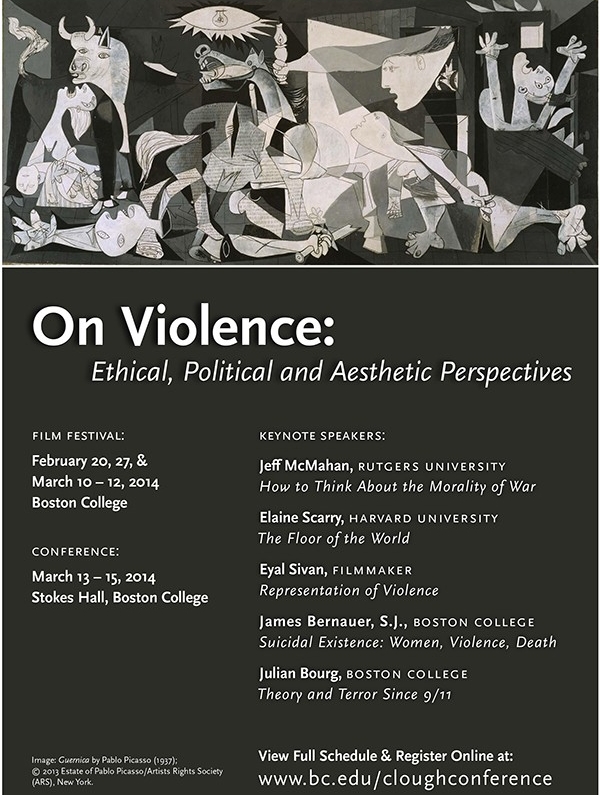
Conference On Violence: Ethical, Political and Aesthetic Perspectives
March 14 – March 15, 2014
Stokes Hall, Room 195S
Jeff McMahan, Rutgers University
“How to Think About the Morality of War”
March 14 · 5:30 p.m.
Elaine Scarry, Harvard University
“The Floor of the World”
March 15 · 3:45 p.m.
CONFERENCE SCHEDULE
Thursday, March 13: Higgins Hall, Room 300
| 6:30 p.m. | Keynote Address by Eyal Sivan, Filmmaker |
7:00 p.m. | The Specialist (Eyal Sivan, 1999, 128 min.) |
9:15 p.m. | Roundtable: The Representation of Violence With Eyal Sivan (filmmaker), Peter Hanly (Boston College), and John Michalczyk (Boston College) |
Friday, March 14: Stokes Hall
4:00 p.m. | Welcome Remarks |
4:15 p.m. | Roundtable Drones, Risk, and Killing as Sacrifice: The Cost of Remote Warfare Stokes Hall, 203N |
5:15 p.m. | Coffee Break |
5:30 p.m. | Keynote Address by Jeff McMahan, Rutgers University |
| 7:00 p.m. | Dinner* Heights Room, Corcoran Commons *Please notify Jorden Wiggins of any dietary restrictions by 3/03/14 |
Saturday, March 15: Stokes Hall
9:00 a.m. | Breakfast |
9:30 a.m. | Roundtable The Biopolitics of Revenge in a Nietzschean Theory of Justice Spaces of Revolt: Lacan, Kristeva, and the Ethics of Desire in Stokes Hall, 203N |
11:00 a.m. | Coffee Break |
11:15 a.m. | Lectures Theory and Terror Since 9/11 Stokes Hall, 195S |
| 12:45 p.m. | Lunch |
| 2:00 p.m. | Roundtable The Reciprocal Effect of Violence On the Immanent Production of Moral Technology |
| 3:30 p.m. | Coffee Break |
| 3:45 p.m. | Keynote Address by Elaine Scarry, Harvard University The Floor of the World Respondent: Paulo Barrozo, Boston College Law School Stokes Hall, S195 |
![]() violence-program.pdf
violence-program.pdf
Download a PDF version of the conference program.
FILM FESTIVAL SCHEDULE
February 20 | Jaffa, The Orange Clock’s Work (Eyal Sivan, 2009, 88 min.) |
February 27 | Common State, Potential Conversation (Eyal Sivan, 2012, 123 min.) |
March 10 | The Big Heat (Fritz Lang, 1953, 90 min.) |
March 11 | The Act of Killing (Josh Oppenheimer, 2012, 115 min.) |
| March 12 Higgins 300 | The White Ribbon (Michel Haneke, 2009, 144 min) 6:30 p.m. Film 9:00 p.m. Discussion led by Vanessa Rumble, Boston College |
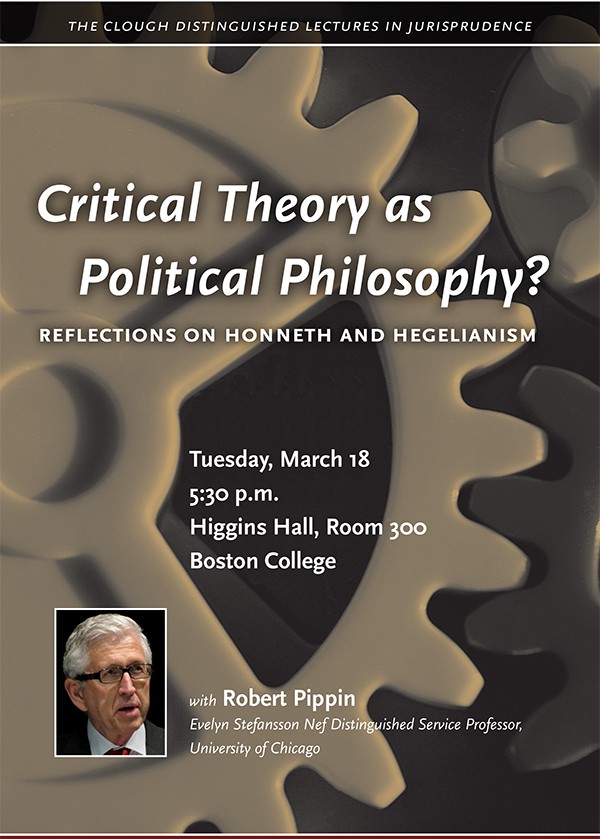
Critical Theory as Political Philosophy?
Reflections on Honneth and Hegelianism with Robert Pippin
Tuesday, March 18, 2014
5:30 p.m.
Higgins Hall, Room 300
Robert Pippin is the Evelyn Stefansson Nef Distinguished Service Professor at the Department of Philosophy of the University of Chicago.
Working primarily within the German philosophical tradition, Professor Pippin has written extensively on self-consciousness, conceptual change, freedom, and issues within political philosophy. He is a leading scholar of several philosophers, including Georg Wilhelm Friedrich Hegel, Immanuel Kant, Friedrich Nietzsche, Marcel Proust, Hannah Arendt, Leo Strauss, and Henry James. Notably, however, his scholarship also extends to both ancient philosophy and critical theory, and his works have explored several interdisciplinary subjects, such as literature, modern art, and film.
Professor Pippin holds a B.A. from Trinity College and a Ph.D. from Pennsylvania State University. Currently a fellow of the American Academy of Arts and Sciences and a member of the American Philosophical Society, he has also been an Alexander von Humboldt fellow and a fellow at the Wissenschaftskolleg zu Berlin. Among others, his books include Hegel's Idealism: The Satisfactions of Self-Consciousness (1989), Modernism as a Philosophical Problem: On the Dissatisfactions of European High Culture (1991), Nietzsche, Psychology, and First Philosophy (2011), and Hollywood Westerns and American Myth: The Importance of Howard Hawks and John Ford for Political Philosophy (2013).
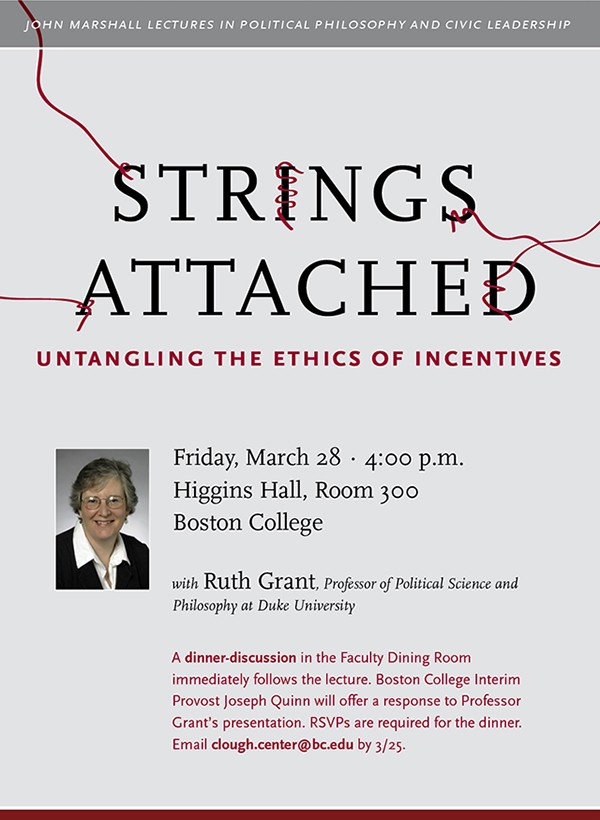
Strings Attached: Untangling the Ethic of Incentives with Ruth Grant
Friday, March 28, 2014
4:00 p.m.
Higgins Hall, Room 300, Boston College
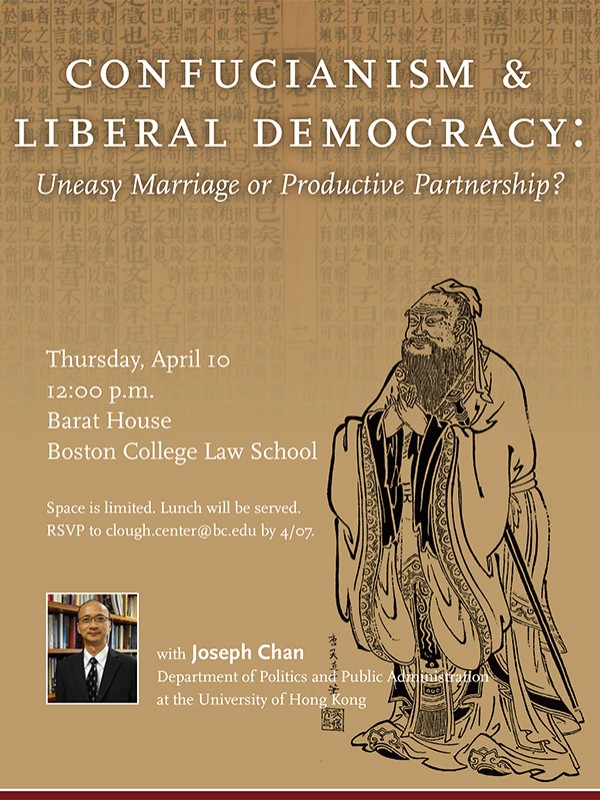
Confucianism and Liberal Democracy: Uneasy Marriage or Productive Partnership? with Joseph Chan
Thursday, April 10, 2014
12:00 p.m.
Barat House, Boston College Law School
Space is limited. Lunch will be served. RSVP by 4/07.
Joseph Chan is the head of the Department of Politics and Public Administration at the University of Hong Kong. He earned his undergraduate degree in political science at the Chinese University of Hong Kong, his M.Sc. at the London School of Economics, and his D.Phil. at Oxford University.
Professor Chan researches in the areas of contemporary liberalism, political philosophy, and civil society. Specifically, he has concentrated on the ways in which Confucian political thought can mix with liberal democratic traditions and the implications for this on human rights, social justice, and civil liberty. Decoupling democratic institutions from their typical foundation in liberal political philosophy and individual sovereignty, he advocates that they can be grounded on Confucian principles in such a way that democratic governance and participation are strengthened, not hindered. In this way, the spirit of the Confucian ideal can address modern social and political challenges. He explores these issues in his book Confucian Perfectionism: A Political Philosophy for Modern Times (January, 2014).
Professor Chan has been a visiting scholar at the Harvard-Yenching Institute and a founding director of the University of Hong Kong Centre for Civil Society and Governance. His articles have been published in China Quarterly, Ethics, History of Political Thought, Journal of Chinese Philosophy, Journal of Democracy, Oxford Journal of Legal Studies, Philosophy and Public Affairs, and Philosophy East and West.
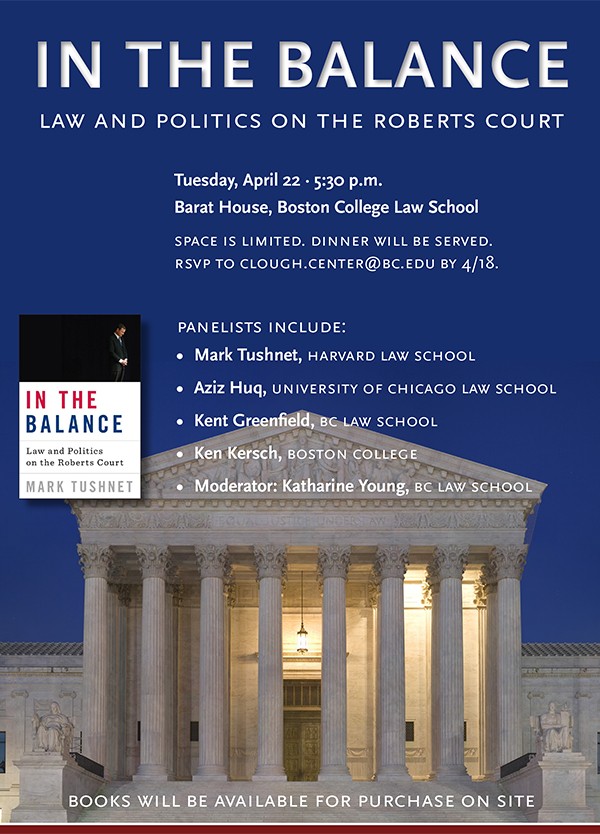
In the Balance: Law and Politics on the Roberts Court
Tuesday, April 22, 2014
5:30 p.m.
Barat House, Boston College Law School
Space is limited. Dinner will be served.
Mark Tushnet is William Nelson Cromwell Professor of Law at Harvard Law School. Professor Tushnet, who graduated from Harvard College and Yale Law School and served as a law clerk to Justice Thurgood Marshall, specializes in constitutional law and theory, including comparative constitutional law. His research includes studies examining (skeptically) the practice of judicial review in the United States and around the world. He also writes in the area of legal and particularly constitutional history, with works on the development of civil rights law in the United States and (currently) a long-term project on the history of the Supreme Court in the 1930s.
Aziz Huq is Assistant Professor of Law and Herbert and Marjorie Fried Teaching Scholar at the University of Chicago Law School. He earned his BA summa cum laude in International Studies and French from the University of North Carolina at Chapel Hill in 1996 and his law degree from Columbia Law School in 2001, where he was awarded the John Ordronaux Prize. He clerked for Judge Robert D. Sack of the U.S. Court of Appeals for the Second Circuit (2001–02) and Justice Ruth Bader Ginsburg of the Supreme Court of the United States (2003–04). After clerking he worked as Associate Counsel and then Director of the Liberty and National Security Project of the Brennan Center for Justice at NYU School of Law. He has also been a Senior Consultant Analyst for the International Crisis Group.
His research and teaching interests include constitutional law, national security and counterterrorism, federal jurisdiction, legislation, human rights, and comparative constitutional law.
Kent Greenfield is Professor of Law and Law Fund Research Scholar at Boston College Law School, where he teaches and writes in the areas of business law, constitutional law, decision making theory, legal theory, and economic analysis of law. He is the past Chair of the Section on Business Associations of the American Association of Law Schools. In addition, he is the author of the book “The Myth of Choice,” published in 2011 from Yale University Press, Prunsoop Publishing (in Korean), and BiteBack Publishing (UK). Kirkus Reviews stated in its review: “The author deftly debunks prevailing dogma about the infallibility of free markets, especially important during a time when, as he reports, one in seven Americans are poor." He is also the author of the book “The Failure of Corporate Law” published by University of Chicago Press. The book has been called “simply the best and most well-reasoned progressive critique of corporate law yet written,” and the Law and Politics Book Review said that “it merits a place alongside Berle and Means, [and] Easterbrook and Fischel.”
Ken Kersch is associate professor of political science, with additional appointments in the university’s history department and law school. His primary interests are American political and constitutional development, American political thought, and the politics of courts. Kersch is the recipient of the American Political Science Association's Edward S. Corwin Award (2000), the J. David Greenstone Prize (2006) from APSA's politics and history section, and the Hughes-Gossett Award from the Supreme Court Historical Society (2006).
Professor Kersch has published many articles in academic, intellectual, and popular journals. He is the author of The Supreme Court and American Political Development (Kansas, 2006) (with Ronald Kahn), Constructing Civil Liberties: Discontinuities in the Development of American Constitutional Law (Cambridge, 2004), and Freedom of Speech: Rights and Liberties Under the Law (ABC-Clio, 2003). He is currently completing a book entitled Conservatives and the Constitution: From Brown to Reagan (Cambridge University Press).
Katharine Young joined the faculty as Associate Professor in July 2013. Before coming to Boston College, she was an Associate Professor at the Australian National University, and has been a Visiting Assistant Professor at Boston University and a Byse Teaching Fellow at Harvard Law School. Her fields of expertise are economic and social rights, comparative constitutional law and international human rights law.
Professor Young’s recent book, Constituting Economic and Social Rights (OUP, 2012), is published in the Oxford Constitutional Theory series. Other recent publications have appeared in the Harvard Human Rights Journal, the Harvard Law Review Forum, the International Journal of Constitutional Law, the Australian Year Book of International Law, and the Yale Journal of International Law.
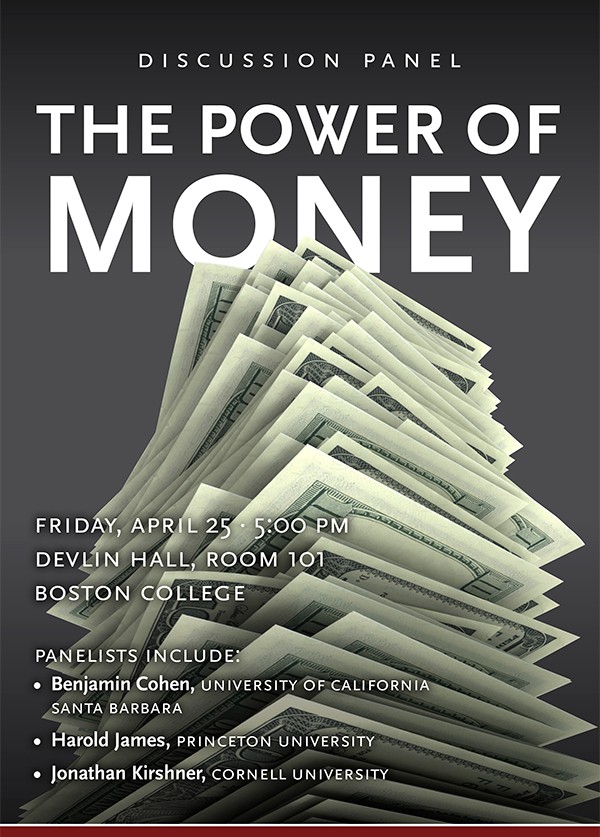
The Power of Money Panel
Friday, April 25, 2014
5:00 p.m.
Devlin Hall, Room 101
Featuring Jonathan Kirshner of Cornell, and Benjamin Cohen of UC Santa Barbara
Benjamin J. Cohen is Louis G. Lancaster Professor of International Political Economy at the University of California, Santa Barbara, where he has been a member of the Political Science Department since 1991. He was educated at Columbia University, earning a PhD in Economics in 1963. He has worked as a research economist at the Federal Reserve Bank of New York (1962-1964) and previously taught at Princeton University (1964-1971) and the Fletcher School of Law and Diplomacy, Tufts University (1971-1991). A specialist in the political economy of international money and finance, he serves on the editorial boards of several leading academic journals and is the author of fourteen books, including most recently Advanced Introduction to International Political Economy (2014). He has won numerous awards and in 2000 was named Distinguished Scholar of the year by the International Political Economy Section of the International Studies Association.
Jonathan Kirshner is the Stephen and Barbara Friedman Professor of International Political Economy in the Department of Government at Cornell University. He is the author of Currency and Coercion: The Political Economy of International Monetary Power, and Appeasing Bankers: Financial Caution on the Road to War, which won the best book award from the International Security Studies Section of the International Studies Association. He has also edited the volumes Monetary Orders: Ambiguous Economics, Ubiquitous Politics and Globalization and National Security; and is the co-editor (with Eric Helleiner) of the volumes The Future of the Dollar, and The Great Wall of Money: Power and Politics in China’s International Monetary Relations. His most recent books include Hollywood's Last Golden Age, and American Power after the Financial Crisis. From Cornell University Kirshner is a recipient of the Provost's Award for Distinguished Scholarship, and the Stephen and Margery Russell Distinguished Teaching Award.
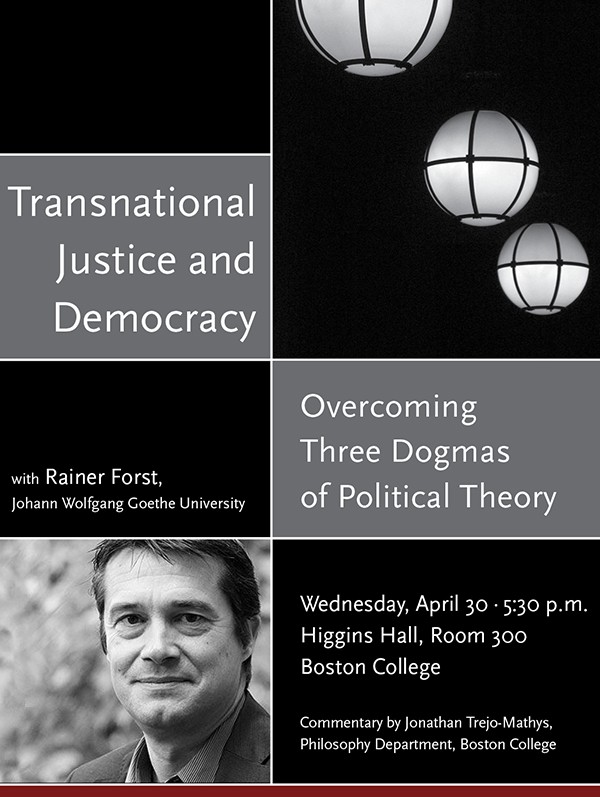
Transnational Justice and Democracy: Overcoming Three Dogmas of Political Theory with Rainer Forst
Wednesday, April 30, 2014
5:30 p.m.
Higgins Hall, Room 300
Rainer Forst is Professor of Political Theory and Philosophy at Johann Wolfgang Goethe University and director of the Normative Orders Research Institute in Frankfurt, Germany. Typically identified with the Frankfurt School of critical theory, he was awarded the 2012 Gottfried Wilhelm Leibniz Prize—the highest honor awarded for research in Germany—for his contributions to political theory and philosophy.
Professor Forst’s interdisciplinary work has focused on morality, justice, tolerance, and democracy and has included pragmatist and normative perspectives. Notably, his works have described the moral basis of human rights and have advocated a transnational conception of justice.
His career extends to both the United States and Europe. After studying under John Rawls at Harvard University, he received his doctorate under the supervision of Jürgen Habermas in 1993. Since then, he has held teaching positions at the Free University Berlin, Dartmouth College, and the New School for Social Research, as well as fellowships with NYU, the German Research Foundation, and the Institute for Advanced Studies of Goethe-University at Bad Homburg near Frankfurt, which he helped co-found. Professor Forst’s publications include Contexts of Justice (2002), Toleration in Conflict (2003), The Right to Justification(2012), and Justification and Critique (2013).
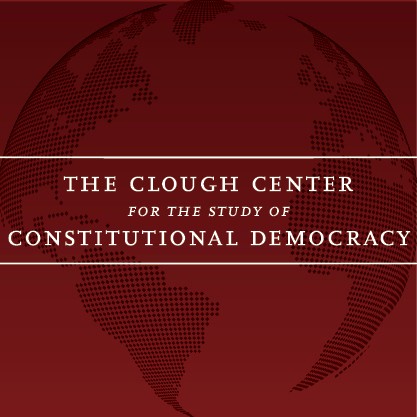
Militarism and Charismatic Authority in the Age of Revolutions with David A. Bell
Friday, May 2, 2014
4:30 p.m.
Stokes Hall, Room 195S
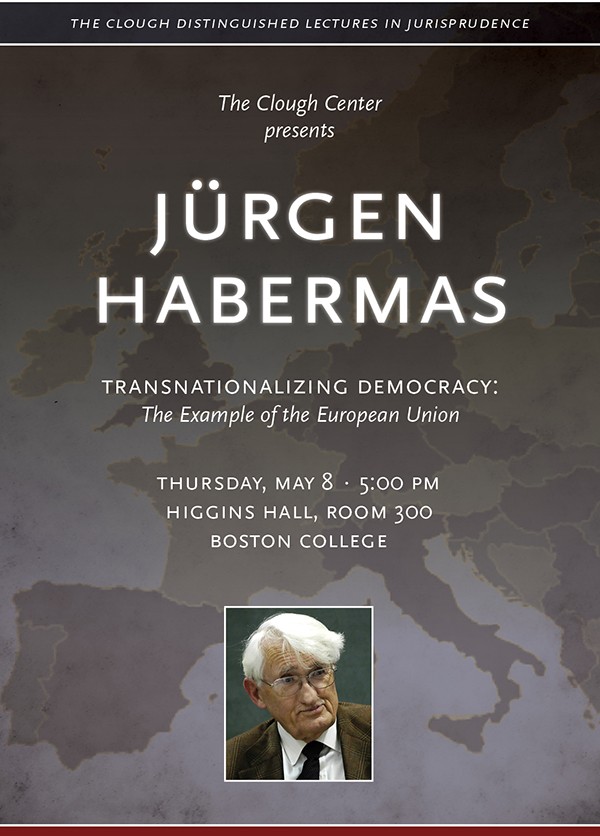
Transnationalizing Democracy: The Example of the European Union with Jurgen Habermas
Thursday, May 8, 2014
5:00 p.m.
Higgins Hall, Room 300
Jürgen Habermas is a sociologist and philosopher closely identified with critical theory and pragmatism. One of the world’s leading intellectuals, he has received wide recognition both for his contributions to philosophy and for his commentaries on contemporary political issues.
Born in Düsseldorf, Germany, in 1929, Habermas was deeply affected by World War II and its aftermath. The revelation of the atrocities of the Third Reich through the Nuremberg Trials had a lasting impact on his political and philosophical views by provoking him to be skeptical of authority. After studying at the universities of Göttingen, Zürich, and Bonn, Habermas earned a doctorate in philosophy in 1954. Two years later, he began a habilitation under the critical theorists Max Horkheimer and Theodor Adorno at the University Frankfurt am Main Institute for Social Research. He later completed his habilitation under Wolfgang Abendroth at the University of Marburg before beginning his teaching career. From 1961 to 1994, Habermas held positions at several German universities; he served as “extraordinary professor” of philosophy at the University of Heidelberg, the chair of philosophy and sociology at the University of Frankfurt am Main, and the director of the Max Planck Institute in Starnberg.
Closely associated with the Frankfurt School of social theory, Habermas is perhaps best known for his scholarship on communicative rationality, the public sphere, linguistic intersubjectivity, and the philosophical discourse of modernity. He first gained extensive public attention in Germany for his first book, Structural Transformation and the Public Sphere (1962), which detailed the social history of the development of the bourgeois public sphere. He later explored political philosophy and critical-social analysis in Toward a Rational Society (1970) and Theory and Practice (1973). In his magnum opus, The Theory of Communicative Action (1981), Habermas criticized the rise of the welfare state, corporate capitalism, and mass consumption as responsible for the rationalization of public life. This rationalization, he argued, resulted in the deterioration of boundaries between public and private life. Furthermore, through the replacement of participatory democracy with representative democracy, it led to the widespread disfranchisement of citizens.
By bridging continental and Anglo-American traditions of thought, Habermas has significantly influenced philosophy, legal thought, sociology, communication studies, argumentation theory, rhetoric, developmental psychology, and theology. Indeed, in 2007, The Times Higher Education Guide listed him as one of the ten most-cited authors in the humanities.
FALL 2013 LECTURES & CONFERENCES
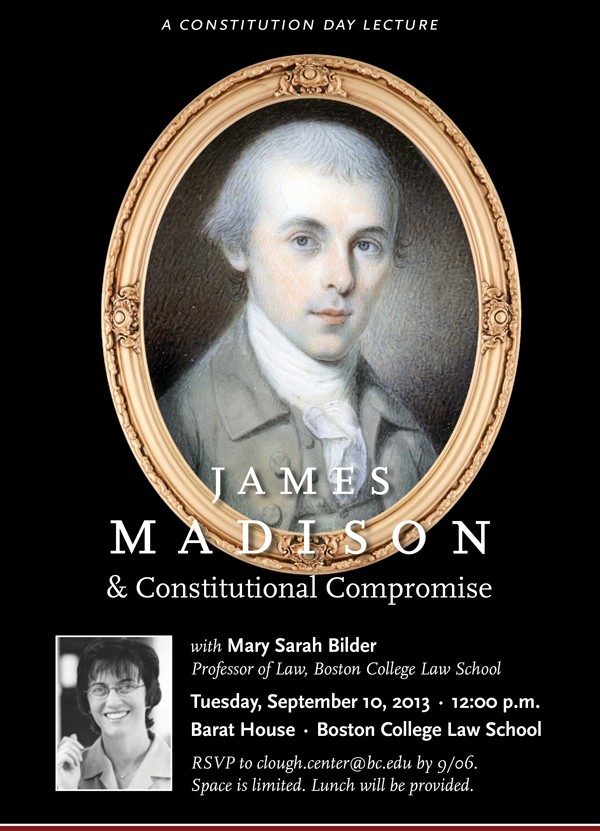
James Madison and Constitutional Compromise with Mary Sarah Bilder
Tuesday, September 10, 2013
12:00 p.m.
Barat House, Boston College Law School
Professor Mary Sarah Bilder teaches in the areas of property, trusts and estates, and American legal and constitutional history at Boston College Law School. She received her B.A. with Honors (English) and the Dean’s Prize from the University of Wisconsin at Madison, her J.D. (magna cum laude) from Harvard Law School, and her A.M. and Ph.D. from Harvard University in the History of American Civilization. She was a law clerk to the Hon. Francis Murnaghan, Jr., U.S. Court of Appeals, Fourth Circuit. She writes primarily in the areas of constitutionalism and the history of the Constitution, early American legal culture and the legal profession, and the history of the book and legal education. She was the Lucy G. Moses Visiting Professor at Columbia Law School in 2001 and was a visiting professor at Harvard Law School in the spring of 2008. Professor Bilder is a member of the American Law Institute, the Colonial Society of Massachusetts, the Massachusetts Historical Society, and a Fellow of the American Bar Foundation. She is member of the State Bar of Wisconsin (inactive status). She was given the Emil Slizewski Faculty Teaching Award in 2007 and was named Michael and Helen Lee Distinguished Scholar in 2009.
She is the author of The Transatlantic Constitution: Colonial Legal Culture and the Empire(Harvard University Press, 2004), awarded the Littleton-Griswold Award from the American Historical Association. She recently co-edited Blackstone in America: Selected Essays of Kathryn Preyer (Cambridge University Press, 2009). Her articles appear in several important collected volumes of essays and a wide variety of journals, including the Yale Law Journal, the Stanford Law Review, the Yale Journal of Law and the Humanities, the George Washington Law Review, Law and History Review, Law Library Journal, and the Journal of Policy History.
She has received a William Nelson Cromwell Foundation Grant, the Boston College Annual Prize for Scholarship, a Boston College Distinguished Research Award, a Mellon Fellowship in the Humanities, and was a Boston College Law School Fund Scholar. She currently serves on the Editorial Board of Law and History Review, and The Journal of Legal Education, the Board of The New England Quarterly, and is a member of the American Law Institute, the Colonial Society of Massachusetts, and the Massachusetts Historical Society.
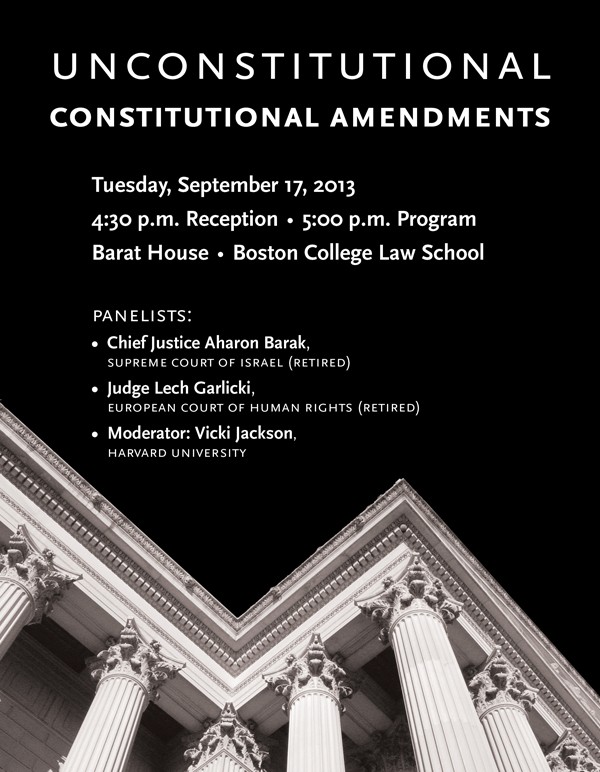
Unconstitutional Constitutional Amendments Panel with Chief Justice Aharon Barak, Judge Lech Garlicki, and Vicki Jackson
Tuesday, September 17, 2013
4:30 p.m. Reception | 5:00 p.m. Program
Barat House, Boston College Law School
The Honorable Aharon Barak is the former President of the Supreme Court of Israel and a recipient of the Israel Prize, widely regarded as the State's highest honor.
Judge Barak was born in 1936 in Kaunas, Lithuania. Upon Kaunas’s occupation by the Nazis in 1941, he and his family were sent to the city’s ghetto, which held up to 40,000 people at its peak. After the war, Judge Barak undertook an arduous journey through Europe before arriving in Mandatory Palestine in 1947. Following a brief period in a moshav, he and his family settled in Jerusalem.
Judge Barak graduated from the Hebrew University of Jerusalem with a degree in law and served for two years in the Israel Defense Forces. He then returned to the Hebrew University, first to pursue a doctorate in law and then to work as a professor. His career at the university culminated with his appointment as Dean of the Faculty of Law in 1974. The following year, Judge Barak not only received the Israel Prize for his legal research but also was appointed Attorney General of Israel. Before his appointment as Justice of the Supreme Court in 1978, he played an integral role in formulating the Camp David Accords between Israel and Egypt.
Judge Barak went on to serve as President of the Supreme Court from 1995 to 2006. Although his legal expertise was originally rooted in civil and commercial law, his tenure on the Court was marked by his influential opinions concerning public and constitutional law. Following his retirement, he has returned to academia and now holds positions at the Interdisciplinary Center Herzliya, the Hebrew University, the Yale Law School, Georgetown University Law Center, and the University of Toronto Faculty of Law.
Lech Garlicki is a judge of the European Court of Human Rights in Strasbourg and the President of the 4th Section of the Court. He is a professor at the Chair of Constitutional Law at the University of Warsaw (Poland).
Judge Garlicki served as a judge of the Constitutional Tribunal (1993- 2001). Prior to that, he practiced as an advocate. Judge Garlicki was a member of the Legislative Council of the Prime Minister and has served as the director of the Centre for American Studies at the University of Warsaw.
He is the author of nearly 250 publications, including 10 monographs, in the fields of Polish and comparative constitutional law and human rights.
Judge Garlicki is a Founding Member of the European Law Institute, a non-profit organization that conducts research, makes recommendations and provides practical guidance in the field of European legal development with a goal of enhancing the European legal integration. He serves on its Membership and Projects Committee(s).
He is also a Visiting Professor of Law and the Peter and Patricia Gruber Fellow in Global Justice at Yale Law School.
Vicki Jackson is the Thurgood Marshall Professor of Constitutional Law at Harvard Law School. Jackson received her B.A. summa cum laude from Yale College in 1972. She earned her J.D. from Yale Law in 1975, where she was an editor of the Yale Law Journal. She served as a clerk for Thurgood Marshall. Jackson was an associate and then partner at the firm of Rogovin, Huge & Lenzner in Washington, D.C. She served as a Deputy Assistant Attorney General in the Office of Legal Counsel at the U.S. Department of Justice. She taught and held several administrative positions at Georgetown University Law Center from 1985 to 2011. She is a prolific author and a towering scholar of constitutional thought. Her latest book is Constitutional Engagement in a Transnational Era.
On December 11, 2012, the United States Supreme Court appointed Jackson as amicus curiae in United States v. Windsor to argue an unrepresented position relating to the legal standing of two of the parties.
Her publications include the book Constitutional Engagement in a Transnational Era.
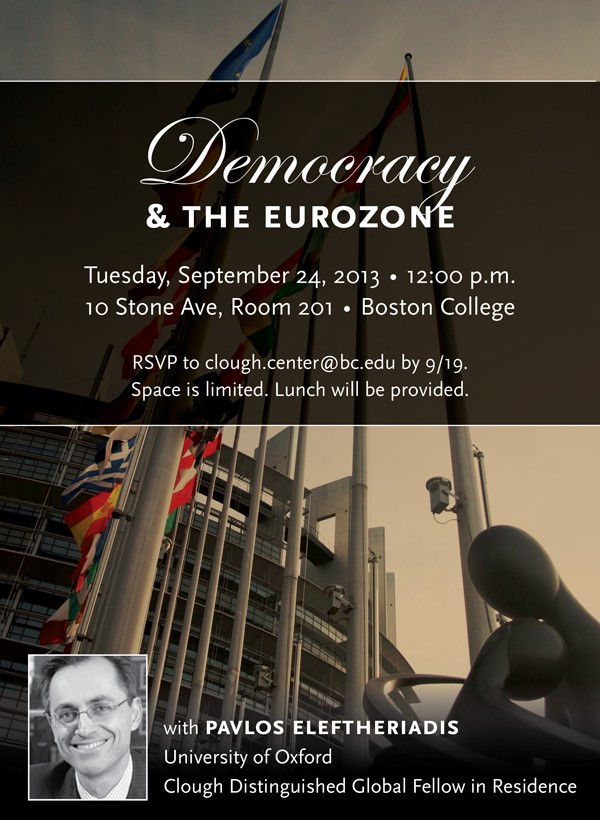
Democracy and the Eurozone with Pavlos Eleftheriadis
Tuesday, September 10, 2013
12:00 p.m.
Barat House, Boston College Law School
Pavlos Eleftheriadis is University Lecturer in the Faculty of Law and Fellow and Tutor in Law at Mansfield College. He teaches and publishes in the philosophy of law, constitutional law, and European Union law. He is also a barrister in England.
Before joining Oxford he was a lecturer at the London School of Economics. He has been a visiting professor of European Law at Columbia University and a visiting fellow in Hellenic Studies at Princeton. He was awarded the Bodossaki Prize for Law in 2005. He is the co-editor of the collection of essays The Philosophical Foundations of European Union Law (Oxford University Press, 2012) and the managing editor of the loose-leaf encyclopedia D. Vaughan and A. Robertson (eds.), The Law of the EU, vols. 1-6 (Oxford University Press, 2007-2013). He has been an active commentator on the Eurozone crisis in the press.
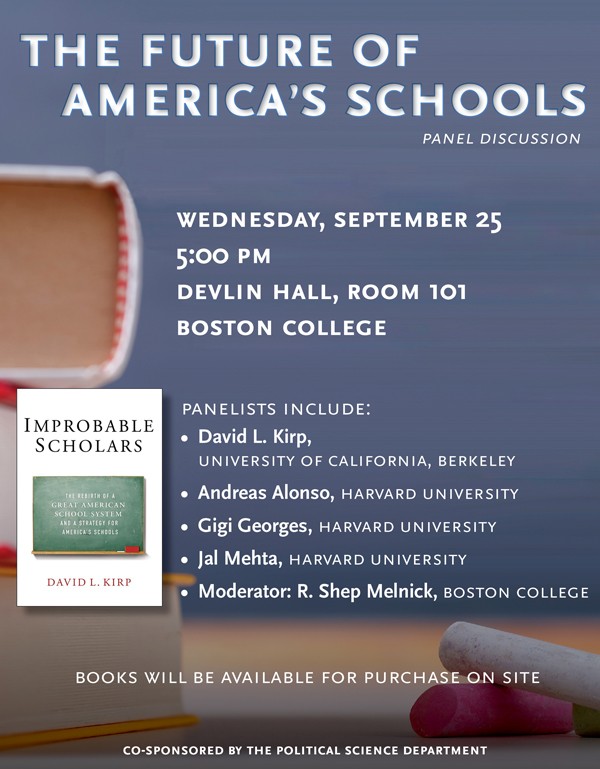
The Future of America's Schools with David Kirp
Wednesday, September 25, 2013
5:00 p.m.
Devlin 101
Panel Discussion with David Kirp,
James D. Marver Professor of Public Policy at the University of California at Berkeley
Panelists include:
- David Kirp, University of California, Berkeley
- Andreas Alonso, Harvard University
- Gigi Georges, Harvard University
- Jal Mehta, Harvard University
- Moderator: R. Shep Melnick, Boston College
David L. Kirp, James D. Marver Professor of Public Policy at the University of California at Berkeley, is a former newspaper editor and policy consultant as well as an academic. His interests range widely across policy and politics. In his seventeen books and scores of articles in both the popular press and scholarly journals he has tackled some of America’s biggest social problems, including affordable housing, access to health, gender discrimination and AIDS. His main focus has been on education and children’s policy, from cradle to college and career.
His latest book, Improbable Scholars: The Rebirth of a Great American School System and a Strategy for American Education, which received starred reviews from Publishers Weekly, Kirkus and Library Journal, has garnered endorsements across the political spectrum. The book chronicles how a poor urban school district (Union City, New Jersey, four miles and a light year from Times Square) has transported Latino immigrant children, many of them undocumented, into the education mainstream: 90 percent of those youngsters are graduating from high school and 75 percent are going to college. It takes the reader from a third grade classroom to the district's headquarters, where the crucial if undramatic system-building gets done, and the potent politics of the community. In its final chapter, the book explores other successful school districts, showing how the lessons learned from these communities can be applied nationwide. As with his other writing, Improbable Scholars is aimed at a broad audience as well as policy-makers and practitioners. A New York Timesarticle making this “back to basics” reform argument was the second most widely emailed article. In recent months, he has written for the Los Angeles Times, Washington Post, American Prospect, The Nation, Slate, Newsweek/Daily Beast, San Francisco Chronicle and New York Daily News.
His work with government agencies and foundations, as well as his teaching and his community activism, address these same issues at ground level. Between the 2008 election and the Inauguration, he served on President Obama’s Transition Team. Kids First: Five Big Ideas for Transforming the Lives of Children (Public Affairs 2011), which emerged from that experience, makes a powerful argument for building systems of support that reach from cradle to college and career. Excerpts and opinion pieces appeared in the Los Angeles Times, The American Prospect and The Nation. The book won the National School Board Journal award for the best education book of 2011.
From the beginning of his career, as a professor at Harvard Graduate School of Education and founding director of the Harvard Center for Law and Education, children’s issues have been David Kirp’s main focus. The Sandbox Investment: The Preschool Movement and Kids-First Politics (Harvard 2007) emerged from his spending several years crisscrossing the country, crouching in prekindergarten classrooms and nurseries across the country and talking with experts in the field. Excerpts appeared in leading newspapers and magazines including the New York Times Sunday Magazine and the Chicago Tribune Sunday Magazine;opinion pieces ran in the Los Angeles Times and the San Francisco Chronicle. It was chosen as a San Francisco Chronicle 2007 “best book” and received the Association of American Publishers Award for Excellence. His account of the market-oriented drift of higher education, Shakespeare, Einstein, and the Bottom Line: The Marketing of Higher Education (Harvard 2004), received the Council for Advancement and Support of Higher Education’s research award and has been translated into numerous languages.
Long committed to developing a new generation of public leaders, he is a recipient of Berkeley’s Distinguished Teaching Award. He twice received the Gustavus Meyers Human Rights Award, for Learning by Heart: AIDS and America’s Communities and Our Town: Race, Housing and the Soul of Suburbia and in 2012 received the "Champion for Children" award from First Focus. He frequently consults with nonprofits and government agencies at the federal, state and local levels. He has also lectured at universities across the country and around the globe, among them Harvard, Yale, Columbia, Brown, NYU, Princeton, Chicago, UC-San Diego, Rutgers, UCLA, New School, Boston College, Glasgow, Ben Gurion, Wellington, Melbourne, Trento, Oslo, Bergen, ITAM (Mexico), Vigo (Spain) and McGill, and has been a visiting scholar at the Federal Reserve.
David Kirp is a graduate of Amherst College—a former trustee of his alma mater—and Harvard Law School. He currently serves as a member of the board of two cutting-edge nonprofits, Experience Corps and Friends of the Children, and on the international advisory committee of Escuela Nueva, a Colombia-based nonprofit that in the past quarter-century has transformed the lives of nearly 10 million students across Latin America and elsewhere. At the Goldman School of Public Policy at Berkeley, he launched the New Community Fund, which promotes greater student diversity, and has underwritten an eponymously-named scholarship.
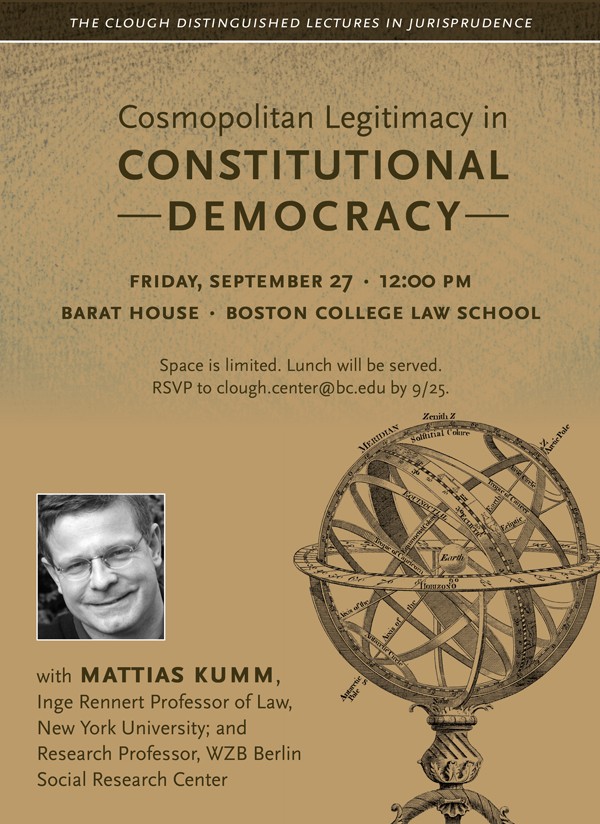
Cosmopolitan Legitimacy in Constitutional Democracy with Mattias Kumm
Friday, September 27, 2013
12:00 p.m.
Barat House, Boston College Law School
Mattias Kumm is the Inge Rennert Professor of Law and has taught at NYU since 2000. His research and teaching focuses on basic issues in Global, European and Comparative Public Law. He also holds a Research Professorship on "Rule of Law in the Age of Globalization" and is Managing Head of the Rule of Law Center at the WZB in Berlin and a Professor of Law at Humboldt University. He was a Visiting Professor and John Harvey Gregory Lecturer on World Organization at Harvard Law School and has taught and lectured at leading universities worldwide. Professor Kumm holds a JSD from Harvard Law School and has pursued studies in law, philosophy, and political sciences at the Christian Albrechts University of Kiel, Paris I Pantheon Sorbonne, and Harvard University before he joined NYU.
Professor Kumm's research and teaching focuses on basic issues in Global, European and Comparative Public Law. His work emphasizes the analytical and normative connection between laws, claims to legitimate authority and the institutional conditions under which such claims can be made plausible. Professor Kumm lives and works in New York City and Berlin.
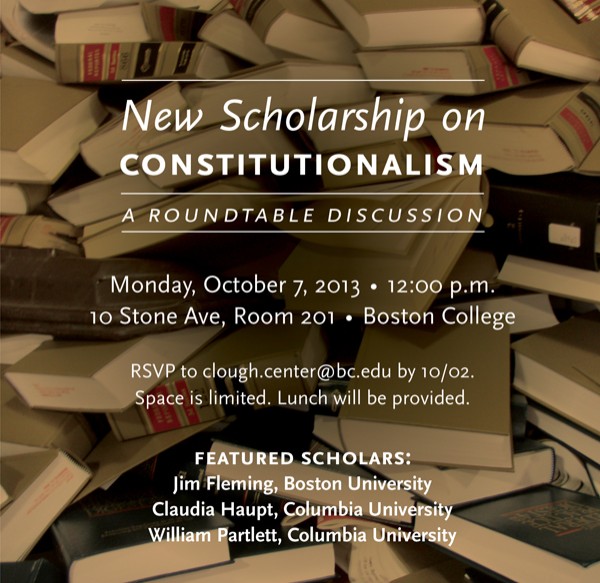
Roundtable New Scholarship on Constitutionalism
Monday, October 7, 2013
12:00 p.m.
10 Stone Ave, Room 201

American Foreign Policy in the Middle East with Vali Nasr
Wednesday, October 9, 2013
5:30 p.m.
Devlin 101
Vali Nasr is the Dean of the Johns Hopkins School of Advanced International Studies. He is a Middle East scholar, foreign policy adviser and commentator on international relations whose most recent book, The Dispensable Nation, deals with the implications of Obama administration’s foreign policy on American strategic interests. His earlier books, Forces of Fortune and The Shia Revival, examined the postwar sectarian violence in Iraq and the uprisings known as the Arab Spring and contributed to U.S. policy formulated in response to those events; prior to being named SAIS dean, was a professor of international politics at Tufts University's Fletcher School of Law and Diplomacy. From 2009 to 2011, Dean Nasr was special adviser to the president's special representative for Afghanistan and Pakistan. He served on the faculties of the Naval Postgraduate School, Stanford University, the University of California, San Diego and the University of San Diego. He was a Carnegie Scholar and a senior fellow at Harvard University's Kennedy School of Government, an adjunct senior fellow for Middle Eastern studies at the Council on Foreign Relations and a senior fellow in foreign policy at the Brookings Institution.
He is currently a member of the U.S. Department of State's Foreign Affairs Policy Board, and a director of the Rockefeller Brothers Fund and the National Democratic Institute. He is also a life member of the Council on Foreign Relations.
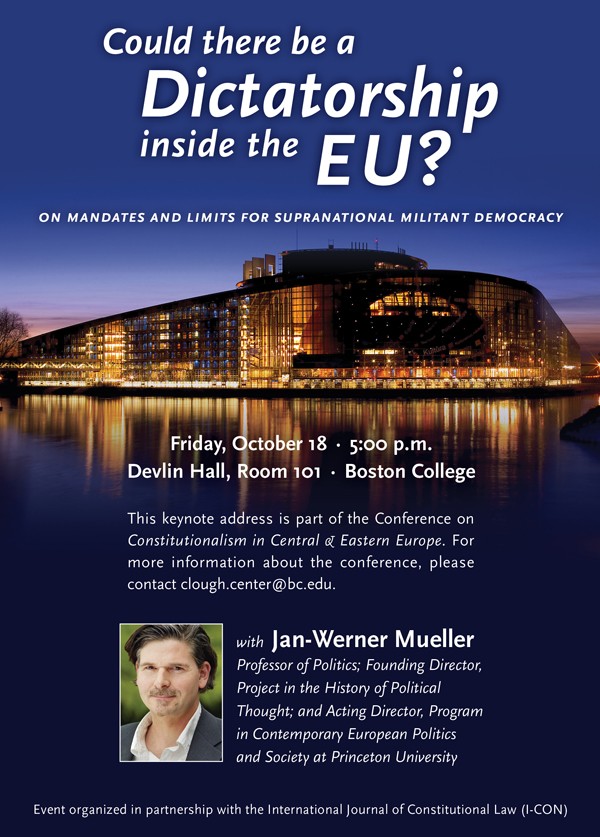
Could There be a Dictatorship inside the EU? with Jan-Werner Mueller
Friday, October 18
5:00 p.m.
Devlin 101
Keynote address by Jan-Werner Mueller, Professor of Politics; Founding Director, Project in the History of Political Thought; and Acting Director, Program in Contemporary European Politics and Society at Princeton University
This keynote address is part of the Conference on Constitutionalism In Central & Eastern Europe. Event organized in partnership with the International Journal of Constitutional Law (I-CON).
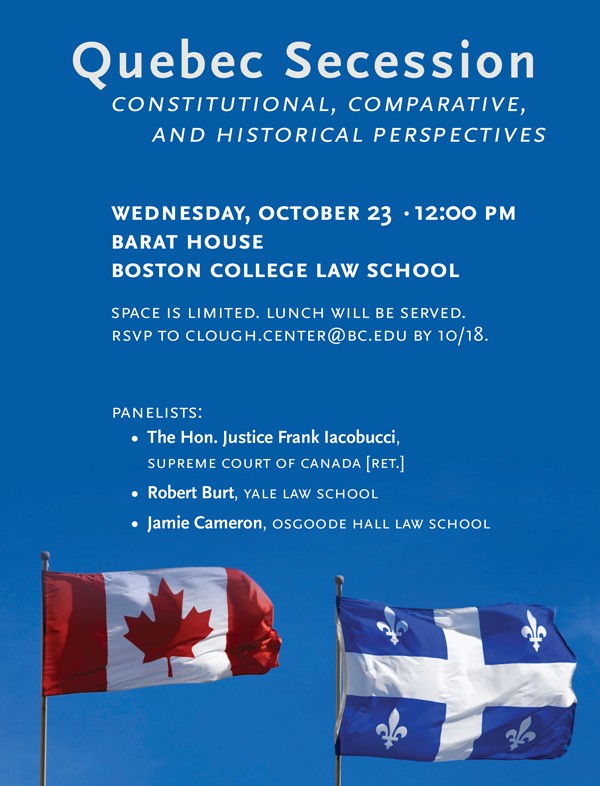
Panel: Quebec Secession: Constitutional, Comparative, and Historical Perspectives
Wednesday, October 23, 2013
12:00 p.m.
Barat House, Boston College Law School
Frank Iacobucci joined Torys, LLP as Counsel in September 2004 after retiring as a Justice of the Supreme Court of Canada. As Counsel, Frank advises government and business on important legal and policy matters. His work includes guidance, advice and support to clients of Torys and members of the firm.
Frank has received numerous awards, honours and other recognitions in Canada, the United States, the United Kingdom and Italy.
Frank has been awarded honorary degrees from University of Western Ontario (2009), McMaster University (2008), University of Trinity College at the University of Toronto (2005), York University (2005), Queen’s University (2005), University of Waterloo (2003), Università della Calabria (Cosenza, Italy) (2003), McGill University (2003), Law Society of Upper Canada (2000), University of Victoria (1996), University of Ottawa (1995), University of British Columbia (1989) and University of Toronto (1989).
He is also an Honorary Fellow of the American College of Trial Lawyers and of St. John’s College, Cambridge. On October 2, 2009, Frank was awarded the Justice Medal for lifetime achievement from the Canadian Institute for the Administration of Justice. He was also appointed a Companion in the Order of Canada in July 2007. In 2010 he was inducted into the Italian Walk of Fame and in 2012 awarded the Queen Elizabeth II Diamond Jubilee Award.
Robert A. Burt is Alexander M. Bickel Professor of Law at Yale University. He has been a member of the Yale faculty since 1976 and previously served on the law and medical school faculties at the University of Michigan and the law faculty at the University of Chicago. Professor Burt has written extensively on constitutional law and biomedical ethics. His most recent book is In the Whirlwind: God and Humanity in Conflict (Harvard Univ. Press 2012). He has previously published Death is That Man Taking Names: Intersections of American Medicine, Law and Culture (Univ. of California Press and the Milbank Memorial Fund, 2002); for preparation of this book, he was awarded a John Simon Guggenheim Fellowship in 1997. He is also author of The Constitution in Conflict (Harvard Univ. Press, 1992), Two Jewish Justices: Outcasts in the Promised Land (Univ. of California Press, 1988), and Taking Care of Strangers: The Rule of Law in Doctor-Patient Relations (Free Press, 1979). He received a J.D. degree from Yale University in 1964, an M.A. in Jurisprudence from Oxford University in 1962 and a B.A. from Princeton University in 1960.
Professor Jamie Cameron has been a full-time member of the faculty at Osgoode Hall Law School since 1984. She holds law degrees from McGill University and Columbia University, clerked at the Supreme Court of Canada for the Hon. Justice Brian Dickson, and was on the faculty at Cornell Law School before joining Osgoode.
Today, Professor Cameron is one of Canada’s senior constitutional scholars, whose research and teaching interests focus on the Charter of Rights and Freedoms, freedom of expression and the press, the Supreme Court of Canada, criminal law, American constitutional law, and judicial biography. She has written extensively in these areas and has been the editor and co-editor of a dozen book collections, including the annual Constitutional Cases volumes, The Charter’s Impact on the Criminal Justice System, Reflections on the Legacy of Justice Bertha Wilson, and The Charter and Criminal Justice: Twenty-Five Years Later.
Earlier in her career she was involved in constitutional reform initiatives, as an advisor to former Ontario Premier David Peterson on the Meech Lake Accord, as a witness to many parliamentary committees, and as an invited member of the National YES Committee during the Charlottetown Accord referendum. She has served as Assistant Dean at the law school, Director of the Centre for Public Law & Public Policy, and as editor-in-chief of the Osgoode Hall Law Journal.
She was editor-in-chief of the Media & Communications Law Review and has been on the Board of Editors for Ontario Reports for more than twenty years. She has been a Director and Vice-President of the Canadian Civil Liberties Association for twenty years, and is also on the Board of Directors of the BC Civil Liberties Association. She has represented the CCLA in cases at the Supreme Court of Canada. In 2012, Professor Cameron completed a six-year term on the Academic Freedom & Tenure Committee of CAUT.
Outside the academy, she sits on the boards of cultural institutions: she has been a Trustee of the McMichael Canadian Art Collection since 2004 and has been Vice-chair of the Board since 2011; in fall of 2011 she joined the Board of Canada’s National Ballet School.
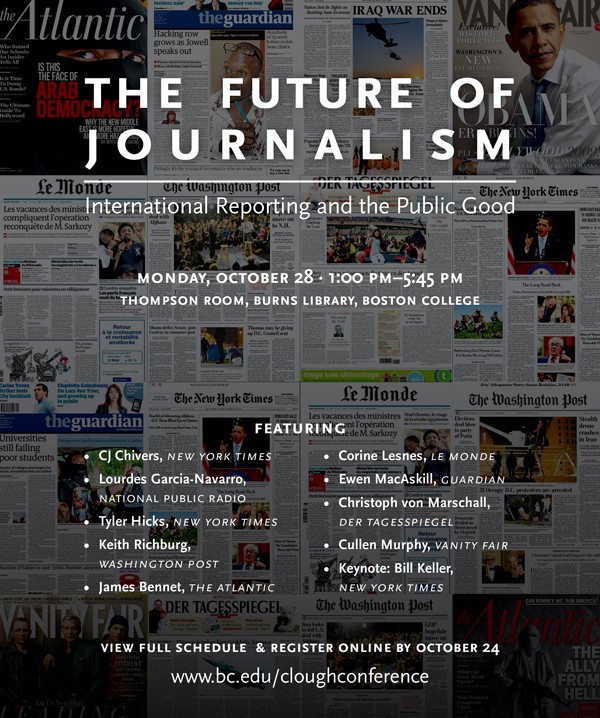
Symposium: The Future of Journalism: International Reporting and the Public Good
Monday, October 28, 2013
1:00 p.m.
Thompson Room, Burns Library
Keynote address by Bill Keller, New York Times (Executive Editor, 2003-2011)
EVENT SCHEDULE
| 1:15 p.m. | Opening Remarks |
1:30 p.m. | Panel I US Correspondents Abroad
|
3:00 p.m. | Break |
3:15 p.m. | Panel II
|
| 4:45 p.m. | Coffee Break |
5:00 p.m. | Keynote Address |
| 5:45 p.m. | Closing |
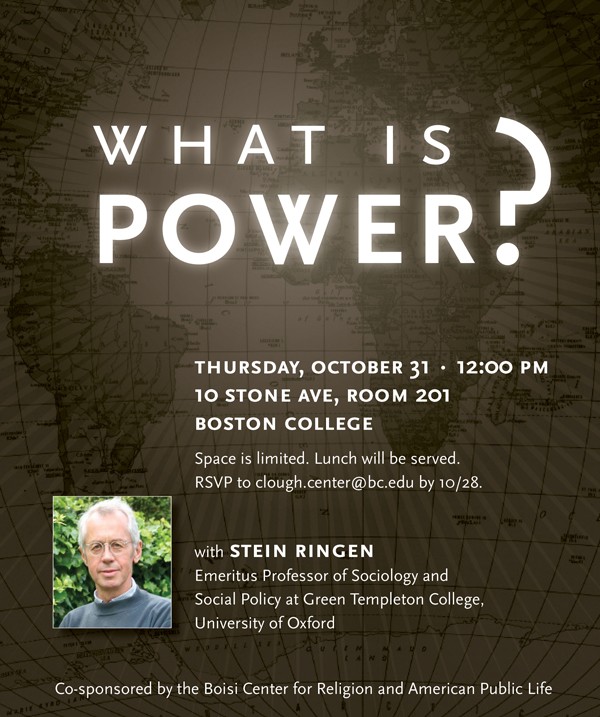
What Is Power? with Stein Ringen
Thursday, October 31, 2013
12:00 p.m.
10 Stone Ave, Room 201
Stein Ringen is Emeritus Professor of Sociology and Social Policy at Green Templeton College, University of Oxford. He was Professor of Welfare Studies at the University of Stockholm and has held visiting professorships and fellowships in Paris, Berlin, Prague, Brno, Barbados, Jerusalem, Sydney, and at Harvard University. He has been Assistant Director General in the Norwegian Ministry of Justice, a consultant to the United Nations, and a news and feature reporter with the Norwegian Broadcasting Corporation. His books include What Democracy Is For: On Freedom and Moral Government(Princeton 2007, Chinese version published by Xinhua in 2012), The Korean State and Social Policy: How South Korea Lifted Itself from Poverty and Dictatorship to Affluence and Democracy (co-authored, Oxford 2011) and The Possibility of Politics: A Study in the Political Economy of the Welfare State (Oxford 1987, Transaction Publishers 2006).
A new book, Nation of Devils: Democracy and the Problem of Obedience, is published by Yale University Press in 2013. He is a visiting professor at Richmond, the American International University in London and Adjunct Professor at Lillehammer University College in Norway.
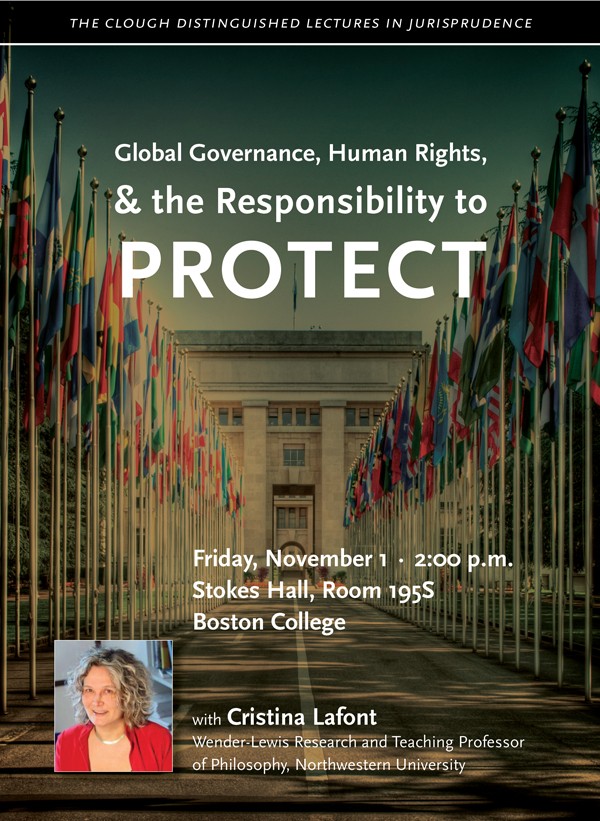
Global Governance, Human Rights and the Responsibility to Protect with Cristina Lafont
Friday, November 1, 2013
2:00 p.m.
Stokes Hall, Room 195S
Cristina Lafont is Wender-Lewis Research and Teaching Professor of Philosophy (Ph.D. University of Frankfurt, 1992; Habilitation University of Frankfurt, 2000). She specializes in German philosophy, particularly hermeneutics and critical theory. She is the author of The Linguistic Turn in Hermeneutic Philosophy (MIT Press, 1999), Heidegger, Language, and World-disclosure (Cambridge University Press, 2000), Global Governance and Human Rights(Spinoza Lecture Series, van Gorcum, 2012), and co-editor of the Habermas Handbuch(Metzler Verlag, 2010). She has also published numerous articles in contemporary moral and political philosophy. In 2011 she was named to the Spinoza Chair at the University of Amsterdam. One of her current research projects focuses on a defense of an ideal of deliberative democracy that could be implemented beyond national borders.
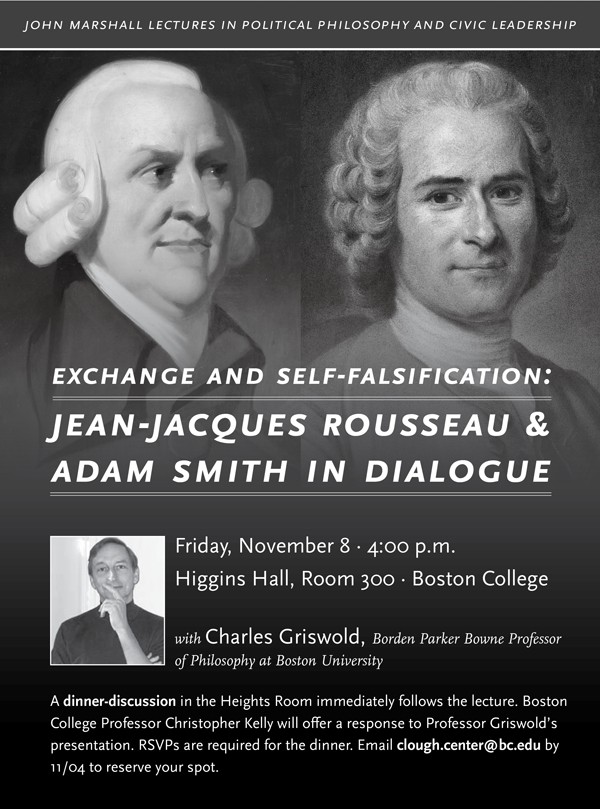
Exchange and Self-falsification: J.J. Rousseau and Adam Smith in Dialogue with Charles Griswold
Friday, November 8, 2013
4:00 p.m.
Higgins 300
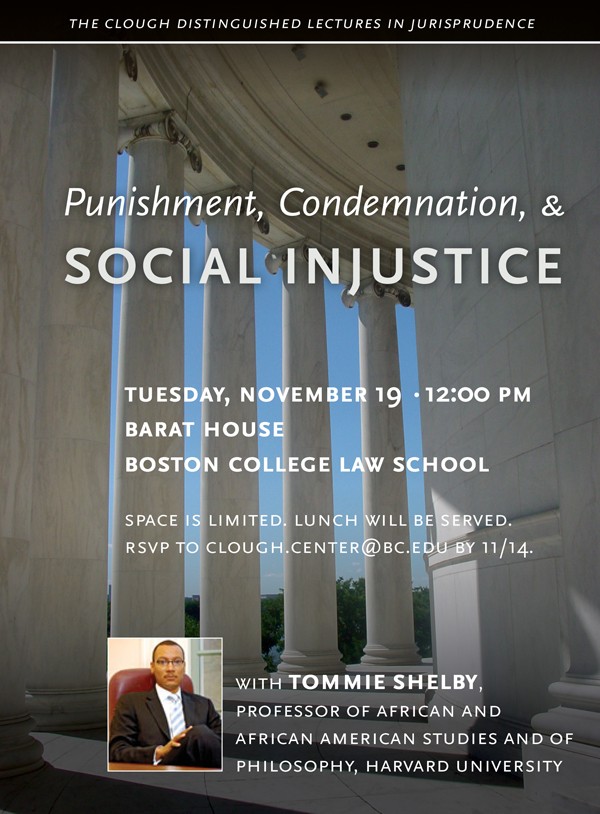
Punishment, Condemnation, and Social Injustice with Tommie Shelby
Tuesday, November 19
12:00 p.m.
Barat House, Boston College Law School
Tommie Shelby holds a joint appointment with the Department of African and African American Studies. He received his B.A. from Florida A & M University (1990) and Ph.D. from the University of Pittsburgh (1998). Prior to coming to Harvard in 2000, he taught philosophy at Ohio State University (1996-2000). His main areas of research and teaching are African American philosophy, social and political philosophy, social theory (especially Marxist theory), and philosophy of social science.
Professor Shelby is the author of We Who Are Dark: The Philosophical Foundations of Black Solidarity (Harvard, 2005) and coeditor (with Derrick Darby) of Hip Hop and Philosophy: Rhyme 2 Reason (Open Court, 2005). Other recent publications include "Justice, Deviance, and the Dark Ghetto," Philosophy & Public Affairs (2007); "Race and Social Justice: Rawlsian Considerations," Fordham Law Review (2004); "Blackness and Blood: Interpreting African American Identity," with Lionel K. McPherson, Philosophy & Public Affairs (2004); "Ideology, Racism, and Critical Social Theory," The Philosophical Forum (2003); "Parasites, Pimps, and Capitalists: A Naturalistic Conception of Exploitation," Social Theory and Practice (2002); and "Foundations of Black Solidarity: Collective Identity or Common Oppression?" Ethics (2002). He is also the coeditor of the journal Transition.
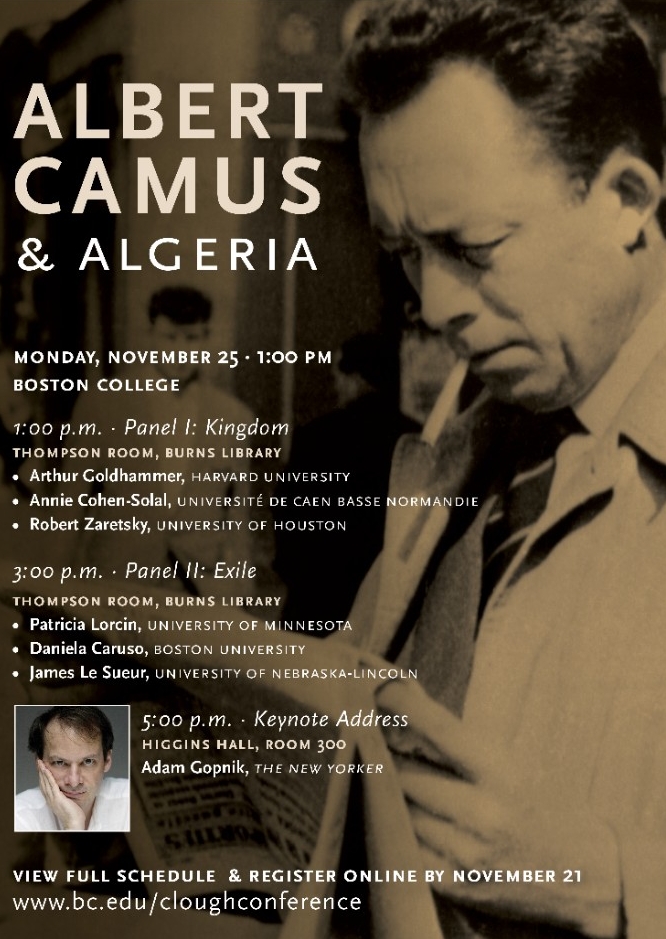
Conference: Albert Camus and Algeria
Keynote Speaker: Adam Gopnik of The New Yorker
Monday, November 25, 2013
Thompson Room, Burns Library
EVENT SCHEDULE
1:00 p.m. | Panel I: Kingdom Arthur Goldhammer, “Algeria Is What Pains Me” Annie Cohen-Solal, “Pour une approche géopolitique des relations entre Camus, Sartre et l'Algérie” Robert Zaretsky, “The Measure of Moderation: Camus and la pensée de midi” |
2:30 p.m. | Coffee Break |
3:00 p.m. | Panel II: Exile Thompson Room, Burns Library Patricia Lorcin, “Politics, Artistic Merit and the Posthumous Reputation of Albert Camus” James Le Sueur, “Albert Camus and the Anticolonials” Daniela Caruso, “Law for Algeria: A European Perspective” |
| 4:30 p.m. | Coffee Break |
5:00 p.m. | Keynote Address |

